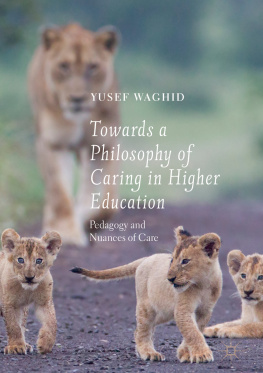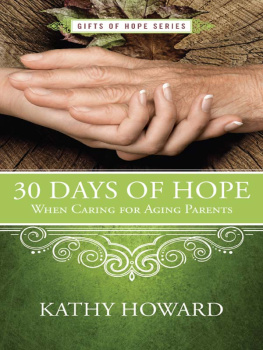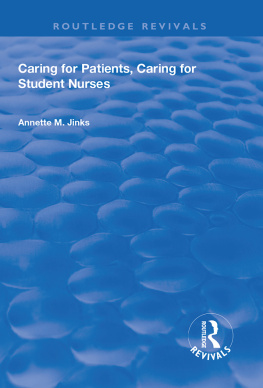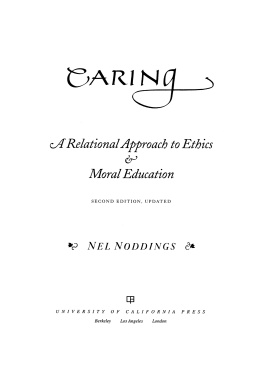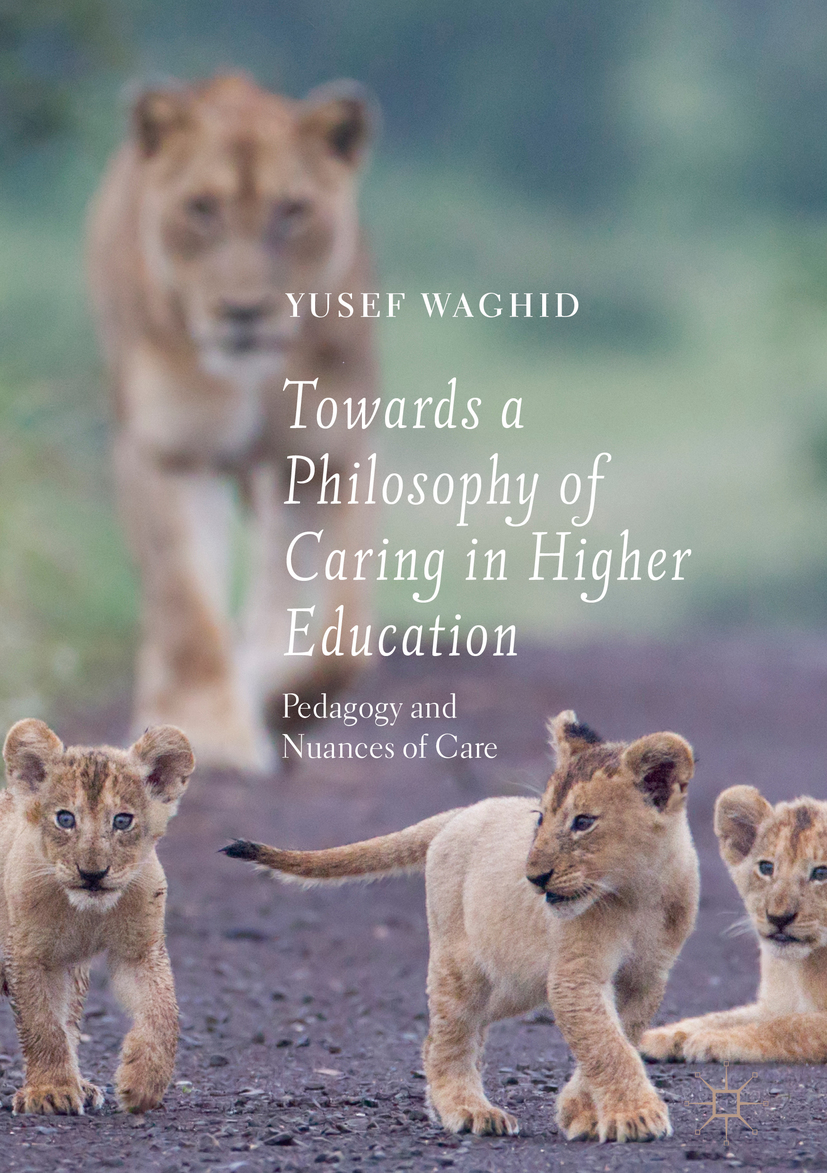Yusef Waghid
Faculty of Education, Stellenbosch University, Cape Town, South Africa
ISBN 978-3-030-03960-8 e-ISBN 978-3-030-03961-5
https://doi.org/10.1007/978-3-030-03961-5
Library of Congress Control Number: 2018962937
The Editor(s) (if applicable) and The Author(s), under exclusive license to Springer Nature Switzerland AG, part of Springer Nature 2019
This work is subject to copyright. All rights are solely and exclusively licensed by the Publisher, whether the whole or part of the material is concerned, specifically the rights of translation, reprinting, reuse of illustrations, recitation, broadcasting, reproduction on microfilms or in any other physical way, and transmission or information storage and retrieval, electronic adaptation, computer software, or by similar or dissimilar methodology now known or hereafter developed.
The use of general descriptive names, registered names, trademarks, service marks, etc. in this publication does not imply, even in the absence of a specific statement, that such names are exempt from the relevant protective laws and regulations and therefore free for general use.
The publisher, the authors and the editors are safe to assume that the advice and information in this book are believed to be true and accurate at the date of publication. Neither the publisher nor the authors or the editors give a warranty, express or implied, with respect to the material contained herein or for any errors or omissions that may have been made. The publisher remains neutral with regard to jurisdictional claims in published maps and institutional affiliations.
Front cover image Hendri Venter / Getty
This Palgrave Macmillan imprint is published by the registered company Springer Nature Switzerland AG
The registered company address is: Gewerbestrasse 11, 6330 Cham, Switzerland
Foreword
In this new book by Yusef Waghid, Towards a Philosophy of Caring in Higher Education, the reader is taken on a tour dhorizon through, as Waghid describes, his personal, public and professional sojourns as a philosopher of education. The itinerary of this journey turns attention to key topics in the current debate on education and learning in the arena of higher education , thoroughly exploring what it would mean to speak of a caring relationship between teacher and students , colleagues and academics , and the global and local community . It opens up a wide, yet well-argued and excellently written theoretical landscape . The reader delves into Waghids rich philosophical expertise in the field of education and learning, linking substantial works of critical pedagogy (Freire ) with feminist ethics of care (Noddings) up to an African ethic of ubuntu caring as an emancipatory, humanising and politico-pedagogical act, to name but a few.
What makes this book most valuable and refreshing in times of turmoil, be that right-wing parties gaining strength in Europe, political inventions such as alternative facts or the imbalance in academic research standards towards quantitative indicators, are not only the profoundly theoretical , but indeed practical elaborations on how to conceptualise and to enact what Waghid calls authentic pedagogical encounters in higher education . Yusef Waghid does not hesitate to tell about and scrutinise his own experiences as a teacher, supervisor or also editor-in-chief. Thereby, he offers insights into personal challenges, in the value of, in that sense, caring dissonance and in supportive academic infrastructures like the SUNCEP SciMatUS programme at Stellenbosch University that addresses the educational needs of students coming from disadvantaged learning environments. In this way, higher education is contextualised: it is embedded in local histories, cultures and communities, also as part of the wider global frame, and the added value of this contextualisation for teachers and students, institutions and communities is recognised pointing to initiatives in higher education, which are gathered, world-wide, under the concept of service-learning (see e.g. Pacho, 2018). The latter exemplifies the point that learning cannot be narrowed down to a neuro-psychological behaviour , but there are ethical and political responsibilities under negotiation, questions of equality and social justice , and ideas of humanity deeply ingrained within.
Tying these issues in with the books key notions of care and rhythm , Waghid explores a so far rather neglected and unknown terrain in the debate on education and learning of adults. The book argues for a rediscovery, and, in this sense, a rewriting of the idea of care. It liberates this idea from a welfare states often paternalistic and deficit-oriented attitude towards its citizens (and dis-citizens, as Devlin and Pothier (2006) remind us), and it cancels the traditional pedagogical hierarchy, inscribed in architecture, curricula and relationships, between a supposed learner in need and a designated teacher who shall take care of that need. Waghid makes the point that the notion of care is meant to be seen away from caringfor and caring about others towards caring with others opening up reciprocal processes in pedagogical encounters instead of a pedagogical one-way traffic and a priori fixed roles and responsibilities (of who is meant to care and who is meant to be taken care of). Yet, this is far away from nave conceptions on harmonising pedagogical encounters , but emphasising, by supporting Cavells (1997) considerations, the value of ruptured moments of scepticism .
In this sense, Waghid argues for an understanding of a rhythmiccaring ; embodying what he calls fluctuations of attachment and detachment , or giving and taking in processes of education and learning . Thus, Waghid urges us to think that rhythmic caring becomes resonant only through mutual relations and back-and-forth fluctuations that allow pedagogical encounters to become more enriching for all those who are involved. Exposing the significance of rhythm as a temporal movement, but also as a subject-related, virtually embodied category in a given society, links the work by Waghid to the current debate on the characteristics of modern societies, also brought forward by Hartmut Rosa (2015), a German sociologist and political scientist. Rosa wishes to identify social acceleration as the dominant feature of todays temporal structure of society lacking relationships of resonance. In discussing such phenomena through the lens of education and learning, the new book by Yusef Waghid provides a vital and much-needed theoretical framework. It opens up an arena for debate, in which the voice of the Swiss psychosociologist Michel Alhadeff-Jones with his work on Time and the Rhythms of Emancipatory Education (2016) also needs to be taken into account, echoing Waghids impetus on the emancipatory potential of education and learning.
Exploring the theoretical frameworks and practicalities of caring , rhythm and pedagogy in higher education and beyond, allows the reader to join this excellent tour dhorizon by Yusef Waghid. It pushes the boundaries of thinking and acting in the arena of education and learning and reminds us of their emancipatory potential: an often downplayed, yet, genuine task and most valuable guiding principle of (adult) education.

